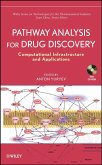This book combines contributions that are brought together from a multidisciplinary team of biologists and computer scientists to explore the issues related to immune function. There is special emphasis on databases with excellent discussion of the strengths and weaknesses of those currently available and criteria that should be met in future projects. The book considers practical applications (e.g. vaccine development) and is of great interest to anyone working in the field of drug development.
The astounding diversity of the immune system and the complexity of its regulatory pathways makes immunology a combinatorial science. Computational analysis has therefore become an essential element of immunology research and this has led to the creation of the emerging field of immunoinformatics. This book is the first to feature thorough coverage of this new field.
Immunoinformatics facilitates the understanding of immune function by modelling the interactions among immunological components. Biological research provides ever deeper insights into the complexity of living organisms while computer science provides an effective means to store and analyse large volumes of complex data. Combining the two fields increases the efficiency of biological research and offers the potential for major advances in the study of biological systems.
This book encompasses key developments in immunoinformatics, including immunological databases, sequence analysis, structure modelling, mathematical modelling of the immune system, simulation of laboratory experiments, statistical support for immunological experimentation and immunogenomics.
The difficulties in effective application of bioinformatic tools in immunology arise at both ends of the spectrum: most immunologists have only a limited comprehension of sophisticated data analysis and applicability and limitations, while the average computer scientist lacks knowledge of the depth and complexity of biological data. The purpose of this book, therefore, is to present contributions from a multidisciplinary team of biologists and computer scientists to explore the issues related to better understanding of immune function and, in particular, to help apply new computer science methods to immunological research.
Related Novartis Foundation symposia:
247 In Silico Simulation of Biological Processes
Chair: Denis Noble
252 Generation and effector functions of regulatory lymphocytes
Chair: Jean-François Bach
Hinweis: Dieser Artikel kann nur an eine deutsche Lieferadresse ausgeliefert werden.
The astounding diversity of the immune system and the complexity of its regulatory pathways makes immunology a combinatorial science. Computational analysis has therefore become an essential element of immunology research and this has led to the creation of the emerging field of immunoinformatics. This book is the first to feature thorough coverage of this new field.
Immunoinformatics facilitates the understanding of immune function by modelling the interactions among immunological components. Biological research provides ever deeper insights into the complexity of living organisms while computer science provides an effective means to store and analyse large volumes of complex data. Combining the two fields increases the efficiency of biological research and offers the potential for major advances in the study of biological systems.
This book encompasses key developments in immunoinformatics, including immunological databases, sequence analysis, structure modelling, mathematical modelling of the immune system, simulation of laboratory experiments, statistical support for immunological experimentation and immunogenomics.
The difficulties in effective application of bioinformatic tools in immunology arise at both ends of the spectrum: most immunologists have only a limited comprehension of sophisticated data analysis and applicability and limitations, while the average computer scientist lacks knowledge of the depth and complexity of biological data. The purpose of this book, therefore, is to present contributions from a multidisciplinary team of biologists and computer scientists to explore the issues related to better understanding of immune function and, in particular, to help apply new computer science methods to immunological research.
Related Novartis Foundation symposia:
247 In Silico Simulation of Biological Processes
Chair: Denis Noble
252 Generation and effector functions of regulatory lymphocytes
Chair: Jean-François Bach
Hinweis: Dieser Artikel kann nur an eine deutsche Lieferadresse ausgeliefert werden.









